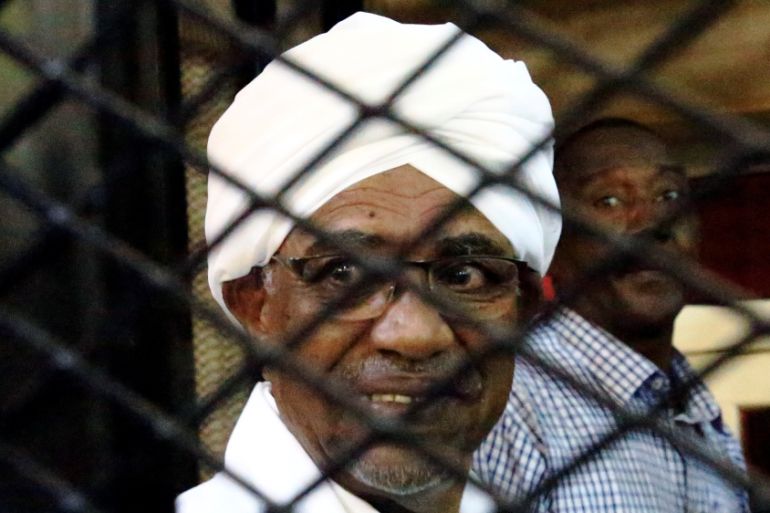Sudan protest group has ‘no objection’ to handing Bashir to ICC
Statement by Forces of Freedom and Change alliance comes as protesters demand answers over June crackdown deaths.

The protest movement that led to the removal of Sudan‘s longtime President Omar al-Bashir has said it is not against handing over the deposed ruler to the International Criminal Court (ICC) to be tried for alleged atrocities in Darfur.
Al-Bashir, who was toppled by the army in April in the face of months-long protests against his rule, has long been wanted by the Hague-based ICC on charges of genocide, war crimes and crimes against humanity for his alleged role in the devastating conflict in the western region of Darfur.
Keep reading
list of 3 itemsOmar al-Bashir on trial: Will justice be delivered?
Sudan’s first cabinet since Omar al-Bashir’s removal sworn in
“We have no objection in handing over Bashir to the ICC,” Ibrahim Al-Sheikh, a leader of umbrella protest movement the Forces of Freedom and Change, told reporters late on Sunday. “All the members of the Forces of Freedom and Change agree on that.”
Al-Bashir is currently being held in a prison in Khartoum, facing trial on corruption charges. He ruled Sudan for three decades after seizing power in a coup in 1989.
Global rights groups, rebel factions who fought al-Bashir’s forces over the years and activists have consistently demanded that the former leader be handed over to the ICC.
After he was deposed on April 11, ICC prosecutors once again demanded al-Bashir stand trial for mass killings in Darfur.
The military generals who had initially seized power in the aftermath of the president’s fall have refused to hand him over to the ICC.
The country has since August been ruled by a joint civilian-military sovereign council, which includes leaders of the protest umbrella. The body is tasked with overseeing the transition to full civilian rule.
The transitional authorities would need to ratify the ICC’s Rome Statute to allow for the transfer of al-Bashir to the Hague.
Sunday protests
Also on Sunday, hundreds of protesters took to the streets in Sudan’s capital, Khartoum, and across the country.
The demonstrations were organised by local groups linked with the Sudanese Professionals Association (SPA), which spearheaded the uprising against al-Bashir.
In Khartoum, the protesters called on authorities to step up an investigation into the hundreds of people who went missing on June 3, when security forces dispersed the main sit-in outside the military headquarters.
|
|
According to the protesters, at least 128 people were killed and hundreds went missing. Authorities put the death toll at 87, including 17 inside the sit-in area.
Dura Gambo, an activist with the SPA, said the demonstrators wanted to know the fate of those who disappeared in the June crackdown.
“If they are alive, where are they, and if they were dead, where are their bodies? This what we want to know,” she said.
The protesters carried posters of the missing people, and marched to the office of the country’s chief prosecutor, where they presented officials with written demands for a new investigation by an independent committee.
Protesters already rejected the results of the prosecutor’s investigation in September, which said the country’s ruling generals did not order the deadly break-up and blamed the deaths on paramilitary forces who exceeded their orders.
Setting up an independent probe into the crackdown was a key point in the transition deal between the military and civilian leaders signed in August.
The new government has a three-year period to steer the country towards elections.
|
|
Sunday’s rallies also took at aim at the lingering influence of al-Bashir’s political system, including his National Congress Party.
Footage circulated online showing the mostly young protesters in the city of Wad Madani, the provincial capital of al-Jazirah province, waving Sudanese flags and calling for the former ruling party’s dissolution, as well as the resignation of the local governor whom al-Bashir had appointed.
There were no reports of any clashes with police or casualties during the protests.
The transitional government previously said it would not appoint governors or an interim parliament until it makes peace with the country’s rebel groups.
The first round of peace talks between government and rebel leaders took place in October in neighbouring South Sudan’s capital, Juba. They are expected to resume later this month.